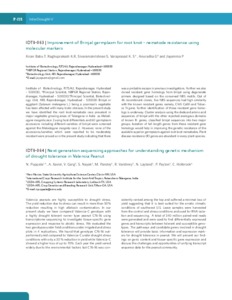Next generation sequencing approaches for understanding genetic mechanism of drought tolerance in Valencia Peanut
Abstract
Valencia peanuts are highly susceptible to drought stress. The yield reduction due to stress can result in more than 50% reduction resulting in high aflatoxin contamination. In our present study we have compared Valencia-C genotype with a highly drought tolerant runner type peanut C76-16 using transcriptome sequencing to investigate tissue-specific gene expression and response to abiotic stress. We evaluated the two genotypes under field conditions under irrigated and stress plots in 4 replications. We found that genotype C76-16 outperformed yield compared to Valencia-C under drought stress conditions with only a 30 % reduction in yield while Valencia-C showed a higher loss of up to 70%. Each year the yield varied widely due to the environmental factors but C76-16 was consistently ranked among the top and suffered a minimal loss of yield suggesting that it is best suited for the erratic climatic conditions of southwest U.S. Leave samples were harvested from the control and stress conditions and used for RNA isolation and sequencing. A total of 340 million paired-end reads were generated and were used to find differentially expressed genes and transcripts between tolerant and susceptible genotypes. The pathways and candidate genes involved in drought tolerance will provide basic information and expression markers for drought tolerance in peanut. We will present our findings on genic content and tissue-specific gene expression and discuss the challenges and opportunities of unifying transcript sequence data for the peanut community

